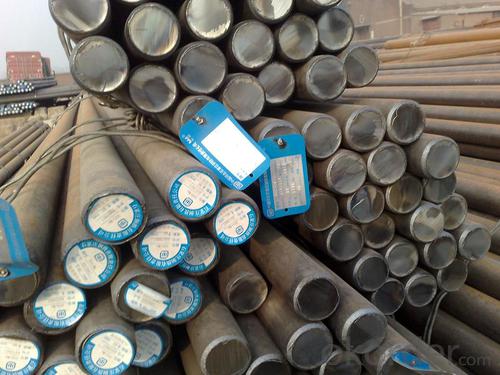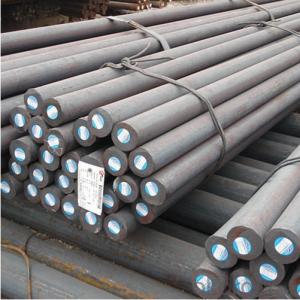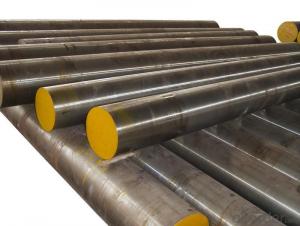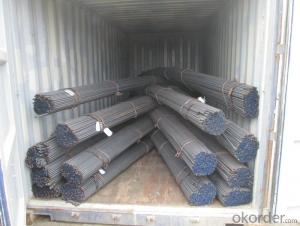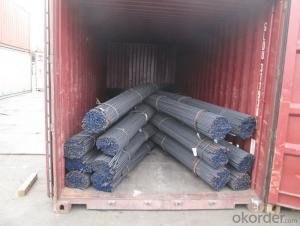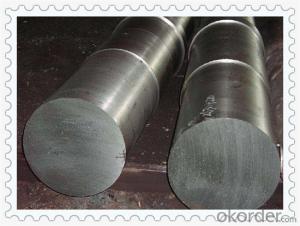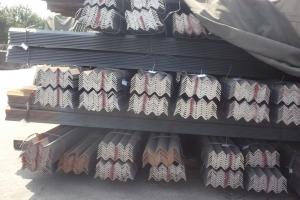Q235 Steel Round Bar From CNBM 16mm-300mm
- Loading Port:
- China main port
- Payment Terms:
- TT OR LC
- Min Order Qty:
- 25 m.t.
- Supply Capability:
- 50000 m.t./month
OKorder Service Pledge
OKorder Financial Service
You Might Also Like
Specification
Q235 Steel Round Bar From CNBM 16mm-300mm
Product Description:
1. Sizes: Diameter: 6mm-150mm; Length: 6m, 9m, 12m
2. Grade: Q195, Q235
3. Invoicing on theoretical weight or actual weight as customer’s request
4. Shape: Round bar, solid bar of steel with circular section
5. Technique: Hot rolled
6. Details of specification
Diameter | Mass | Diameter | Mass | Diameter | Mass |
(mm) | (kg/m) | (mm) | (kg/m) | (mm) | (kg/m) |
6 | 0.22 | 22 | 2.98 | 53 | 17.30 |
7 | 0.30 | 24 | 3.55 | 56 | 19.30 |
8 | 0.40 | 25 | 3.85 | 60 | 22.20 |
9 | 0.50 | 26 | 4.17 | 63 | 24.50 |
10 | 0.62 | 28 | 4.83 | 65 | 26.00 |
11 | 0.75 | 30 | 5.55 | 70 | 30.20 |
12 | 0.89 | 32 | 6.31 | 75 | 34.70 |
13 | 1.04 | 34 | 7.13 | 80 | 39.50 |
14 | 1.21 | 36 | 7.99 | 85 | 44.50 |
15 | 1.39 | 38 | 8.90 | 90 | 49.90 |
16 | 1.58 | 40 | 9.86 | 95 | 55.60 |
17 | 1.78 | 42 | 10.90 | 100 | 61.70 |
18 | 2.00 | 45 | 12.50 | 120 | 88.85 |
19 | 2.23 | 48 | 14.20 | 140 | 120.93 |
20 | 2.47 | 50 | 15.40 | 150 | 138.82 |
Usage and Applications of Steel Round Rod Bar
1. Steel round bar is used in a large number of architectural and engineering structures. Or it can be used in construction of plants for the production of steel house frames, high-voltage transmission towers, bridges, vehicles, boilers, containers, ships, etc.
2. And we can use this kind of product on the performance of the mechanical parts if the demand is not very high.
3. Some especial material steel round bar can be used for main shaft of steamer, hummer shank, with big section and supper force.
Pruduct show:
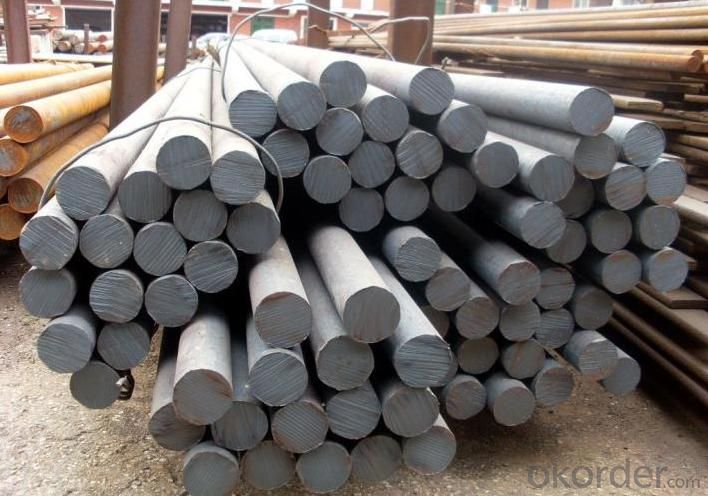
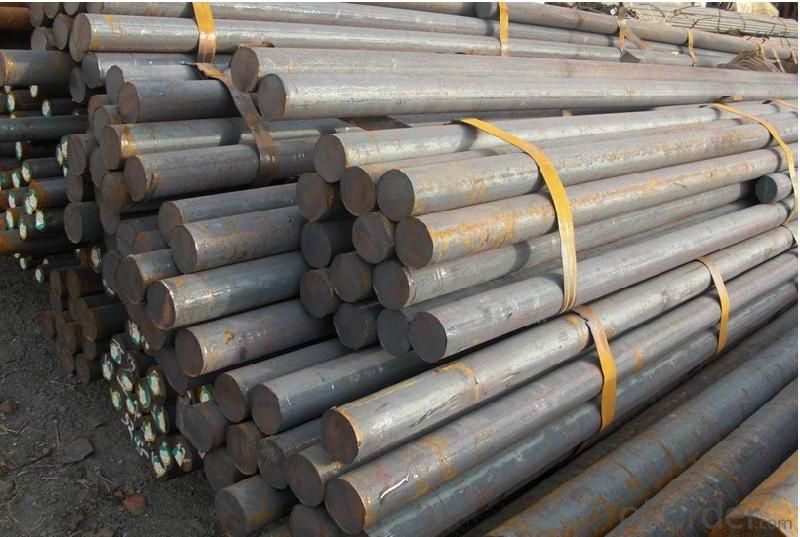
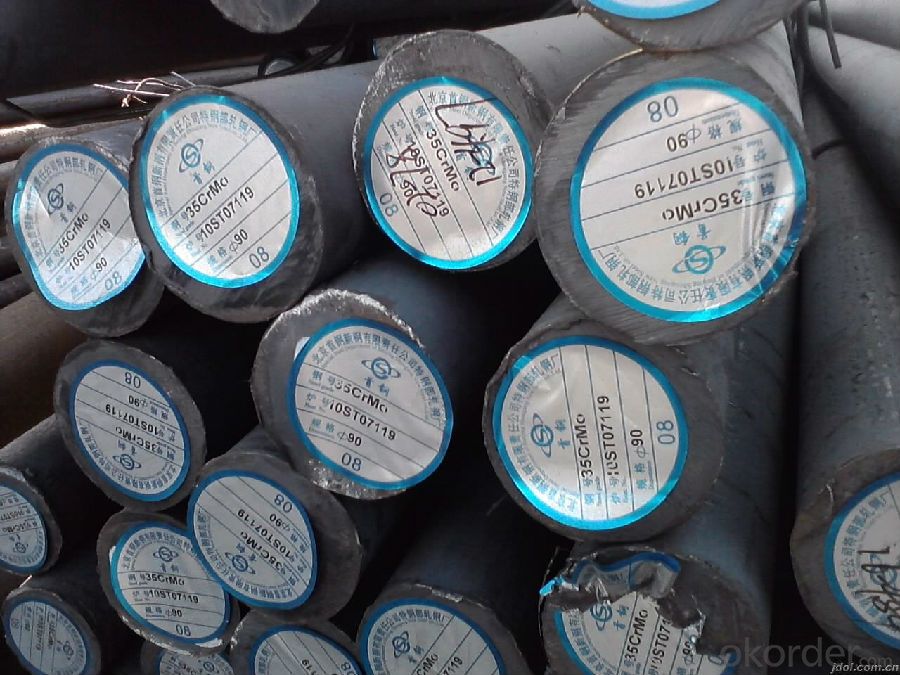
- Q: What are the different methods of surface hardening for special steel?
- There are several methods of surface hardening that can be used for special steel. These methods include: 1. Carburizing: This process involves heating the steel in a carbon-rich environment, such as a gas or liquid, to allow carbon atoms to diffuse into the surface of the steel. This increases the surface hardness and wear resistance of the steel. 2. Nitriding: Nitriding is a process where the steel is heated in a nitrogen-rich environment, causing nitrogen atoms to diffuse into the surface of the steel. This creates a hard, wear-resistant surface layer. 3. Induction hardening: In this method, an alternating current is passed through a coil to create a magnetic field, which induces electrical currents in the steel. The resistance to these currents generates heat, causing the surface of the steel to reach high temperatures and undergo rapid quenching, resulting in increased hardness. 4. Flame hardening: This process involves heating the surface of the steel using a flame or an oxy-fuel torch and then quenching it in water or oil. The rapid cooling from high temperatures helps to achieve surface hardening. 5. Laser hardening: Laser beams are used to heat a specific area of the steel surface, quickly raising the temperature and then rapidly cooling it with a coolant. This localized heating and cooling process increases the hardness of the treated area. 6. Plasma nitriding: In this method, the steel is placed in a low-pressure plasma chamber, where nitrogen ions bombard the surface of the steel, causing nitrogen to diffuse into the surface and form a hardened layer. Each of these methods has its advantages and is suitable for different applications and types of special steel. The choice of surface hardening method depends on factors such as the desired hardness, dimensional limitations, and the specific properties required for the application.
- Q: How does special steel contribute to the telecommunications industry?
- Special steel plays a crucial role in the telecommunications industry by providing the necessary strength, durability, and resistance to various environmental factors. In telecommunications, special steel is primarily used in the manufacturing of transmission towers, antenna systems, and other supporting structures. Transmission towers, for instance, are the backbone of the telecommunications network. They need to be able to withstand extreme weather conditions like strong winds, heavy precipitation, and even earthquakes. Special steel, with its high tensile strength and resistance to corrosion, ensures that these towers remain stable and operational under such challenging circumstances. Furthermore, special steel is also used in the construction of antenna systems. Antennas, whether for satellite communication or wireless networks, require materials that possess excellent electrical conductivity and low signal loss. Special steel alloys can meet these requirements, allowing for efficient signal transmission and reception. Moreover, special steel offers the advantage of being lightweight compared to other materials while maintaining its strength. This weight reduction is particularly beneficial when it comes to constructing structures that need to be installed at significant heights, such as telecommunication towers. By using special steel, telecommunications companies can achieve cost savings in both construction and transportation. Additionally, special steel's durability and resistance to corrosion make it ideal for long-term use in the telecommunications industry. These properties ensure that the structures and equipment made from special steel have an extended lifespan, reducing maintenance and replacement costs. This longevity also contributes to the overall reliability and stability of the telecommunications network. In summary, special steel's unique properties, including its strength, durability, resistance to environmental factors, and efficient signal transmission capabilities, make it an essential material in the telecommunications industry. By providing the necessary support and reliability, special steel contributes significantly to the seamless operation of communication networks, enabling efficient and reliable connectivity for individuals and businesses worldwide.
- Q: What are the different types of free-cutting steel?
- The different types of free-cutting steel include leaded free-cutting steel, sulfurized free-cutting steel, and resulfurized and rephosphorized free-cutting steel.
- Q: What are the different methods for surface hardening special steel?
- There are several methods for surface hardening special steel, including carburizing, nitriding, induction hardening, flame hardening, and laser hardening. Carburizing involves introducing carbon into the surface of the steel through heating in a carbon-rich environment. Nitriding involves diffusing nitrogen into the surface of the steel to create a hard nitride layer. Induction hardening uses electromagnetic induction to heat the surface of the steel and then rapidly quench it to increase hardness. Flame hardening involves heating the surface of the steel with a flame and then quenching it to harden the surface. Laser hardening uses a high-intensity laser beam to heat the surface of the steel and then quench it, resulting in a hardened surface.
- Q: How does special steel contribute to the automotive safety?
- Special steel contributes to automotive safety in several ways. Firstly, it provides increased strength and durability to the vehicle's structure, which helps to absorb and distribute impact forces during collisions, thus protecting the occupants. Secondly, special steel is often used for manufacturing components like airbags, seat belts, and anti-lock braking systems, ensuring their reliability and effectiveness in critical situations. Additionally, this type of steel can enhance the vehicle's resistance against corrosion, reducing the risk of structural damage over time. Overall, special steel plays a vital role in enhancing the safety standards of automobiles.
- Q: How is special steel used in the packaging industry?
- Special steel is used in the packaging industry for a variety of applications such as manufacturing durable and corrosion-resistant containers, packaging machinery, and tools used in the packaging process. It provides strength, reliability, and longevity, ensuring the safety and protection of products during storage and transportation.
- Q: Can special steel be used for making oil and gas industry components?
- Yes, special steel can be used for making oil and gas industry components. Special steels, such as stainless steel and alloy steel, are often preferred in the oil and gas industry due to their exceptional mechanical properties, corrosion resistance, and high temperature resistance. These components are exposed to harsh operating conditions, including corrosive environments, extreme temperatures, and high pressures. Special steels are specifically designed to withstand these conditions and maintain their integrity and performance over time. The use of special steels in the oil and gas industry ensures the reliability, durability, and safety of critical components, such as valves, pipes, fittings, and drilling equipment.
- Q: How do alloying elements affect the properties of special steel?
- The properties of special steel are greatly influenced by alloying elements. By incorporating specific elements into the steel composition, it is possible to achieve a variety of desirable characteristics. To begin with, the addition of alloying elements can enhance the steel's strength and hardness. For instance, chromium, nickel, and molybdenum can improve the steel's resistance to deformation and overall toughness. This is especially vital in situations where the steel needs to withstand high temperatures, pressure, or mechanical stress. Furthermore, alloying elements can boost the corrosion resistance of special steel. Elements like chromium, nickel, and copper create a protective oxide layer on the steel's surface, preventing rusting or corrosion. This is of particular importance in industries such as marine, oil and gas, and chemical processing, where exposure to corrosive environments is common. Moreover, alloying elements can influence the steel's weldability, machinability, and heat treatability. For example, manganese and silicon can enhance the weldability of steel, facilitating the joining of different components. On the other hand, vanadium and tungsten can enhance the steel's ability to maintain its hardness even when subjected to high temperatures, making it suitable for applications involving heat treatment. Additionally, alloying elements can affect the electrical and magnetic properties of steel. Elements like nickel and cobalt can improve the steel's magnetic properties, making it suitable for use in electrical transformers or magnetic devices. Conversely, aluminum and titanium can enhance the steel's electrical conductivity, making it ideal for electrical wiring or conductive components. In conclusion, alloying elements have a significant impact on the properties of special steel. They can enhance its strength, hardness, corrosion resistance, weldability, heat treatability, electrical conductivity, and magnetic properties. By carefully selecting and controlling the alloying elements, manufacturers can customize the steel's properties to meet the specific requirements of different industries and applications.
- Q: Can special steel be used in the defense industry?
- Yes, special steel can be used in the defense industry. Special steel alloys are often used in the manufacturing of military vehicles, aircraft, naval vessels, and weaponry due to their exceptional strength, durability, and resistance to corrosion. These properties make special steel an ideal material for critical components and structures that require high performance and reliability in defense applications.
- Q: How does special steel perform under low temperatures?
- Special steel generally performs well under low temperatures. It has good toughness and ductility, which allows it to withstand cold temperatures without becoming brittle or losing its structural integrity. This makes it suitable for various applications in industries such as aerospace, oil and gas, and automotive, where low-temperature environments are encountered.
Send your message to us
Q235 Steel Round Bar From CNBM 16mm-300mm
- Loading Port:
- China main port
- Payment Terms:
- TT OR LC
- Min Order Qty:
- 25 m.t.
- Supply Capability:
- 50000 m.t./month
OKorder Service Pledge
OKorder Financial Service
Similar products
Hot products
Hot Searches
Related keywords



